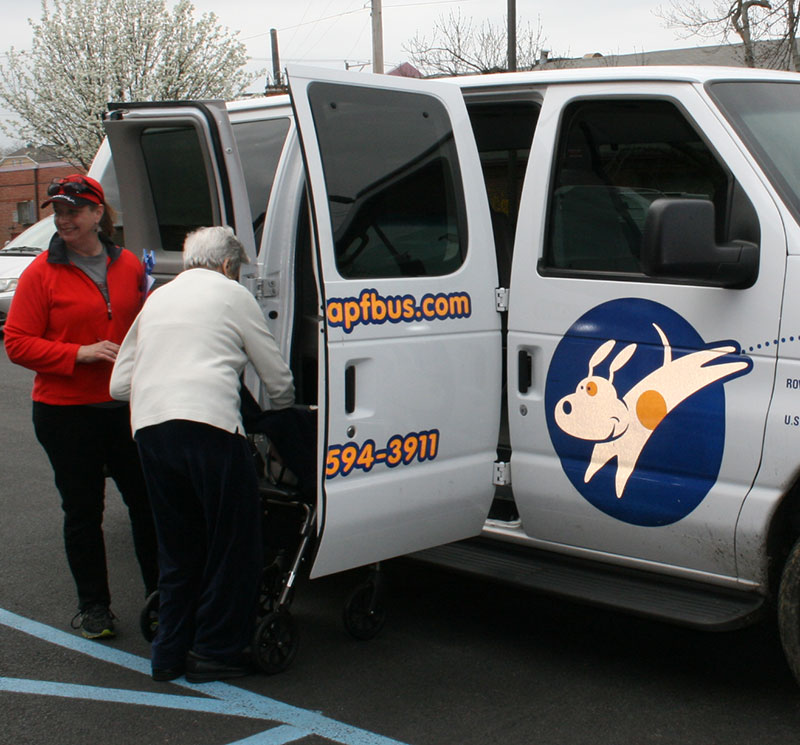Rover Community Transportation provides a county-wide shared ride system that offers seniors door-to-door assistance.
How it Works
The goal of anyone wanting to age in place should be to maintain and/or improve their quality of life. An effective aging in place program focuses on quality of life, including but not limited to the physical home, finances, and personal and medical care. Aging residents receive assistance in their own homes with transportation, cleaning and cooking, visits from health care workers, assistance with maintenance, and help with other services. By providing these services, congregate or institutional care can be postponed or avoided. Municipalities can help residents age in place through their regulations and policies.
Benefits
Supports an Aging Population
Aging in place can help accommodate the projected growth in the number of Americans 65 and older. According to the 2010 decennial census the 65 and older population accounted for about 13% percent of the Chester County population. By 2040, that percentage is expected to increase to 19% percent.
Emotional Security
The elderly can remain in their own home, in a familiar setting and with safety and security.
Cost Efficiency
Nursing home care or assisted living facilities are typically much more expensive than providing services to elders living in their own homes.
Resource Conservation
Aging in place helps to defer new greenfield development, thereby conserving and protecting valuable natural resources. The use of existing housing stock reduces the need to expend energy in new construction.
Senior centers provide multiple programs for seniors to help them continue to live an active lifestyle.
Get Started
Municipalities can cultivate a climate that encourages the opportunity for aging in place. At the non-regulatory level, municipalities can support aging in place by providing financial support for local senior centers that provide services and support for volunteers needed to implement in-home support for seniors in need. Further, support for increased access to public transit must be considered to connect the elderly to medical and other services.
At the regulatory level municipalities should encourage opportunities for aging in place in zoning and land development ordinances. Zoning provisions should be evaluated to allow more flexible land use regulations. Examples to evaluate include: allowing a greater number of unrelated elderly persons to live together, setback relief for Americans With Disabilities Act building components, and the allowance of accessory dwellings for family members or caretakers to live on-site. Land development provisions should include the incorporation of Universal Design standards for residential projects to encourage accessible design for new construction.
Further, a support system is also needed for family members or other caregivers of those who are aging in place. Supports may include respite care, adult day care, or flexible work schedules or work adjustments provided through the Federal Family and Medical Leave Act granted by employers for the care of an aging parent or other relative.
Municipalities can also accommodate opportunities for aging in place by encouraging developments to include sidewalks that make it easier to avoid relying on cars, include amenities such as street furniture and other places to sit.
Considerations
Demand for Social Services
Social services will be dependent on mobile access to individual dwellings as the residents’ own mobility declines. Families and community groups must commit to providing in-home services to elders, and service needs will become more comprehensive and intensive as the residents age.
Emergency Services
Emergency service providers will need to maintain current lists of dwellings with elderly residents, who may be dispersed within the municipality.
Maintenance
Home and property maintenance usually becomes more difficult for elderly homeowners to manage, and it is important that homeowners have access to financial resources as they age.
Financial Scams
Elders aging in place and living alone may be more susceptible to deceptive financial practices or possibly elder abuse.
Examples
Downingtown Area Senior Center
The Downingtown Area Senior Center provides programs and services that are designed to encourage an active and healthy lifestyle that can help support residents who remain in their homes.

East Coventry and West Goshen Zoning Ordinances
East Coventry Township and West Goshen Township include within their existing zoning ordinances standards for accessory apartments and in-law suites to serve families desiring to have family members age in place. These suites are accessory and subordinate to the principal dwelling, can be located in an accessory structure and are inclusive of separate living, cooking, and bathing facilities. Accessory apartments can also contribute additional revenue to help the elderly remain in their homes.
In general, municipal ordinances should permit care-givers or the elderly to occupy either the primary residence or a secondary living unit on the site.




